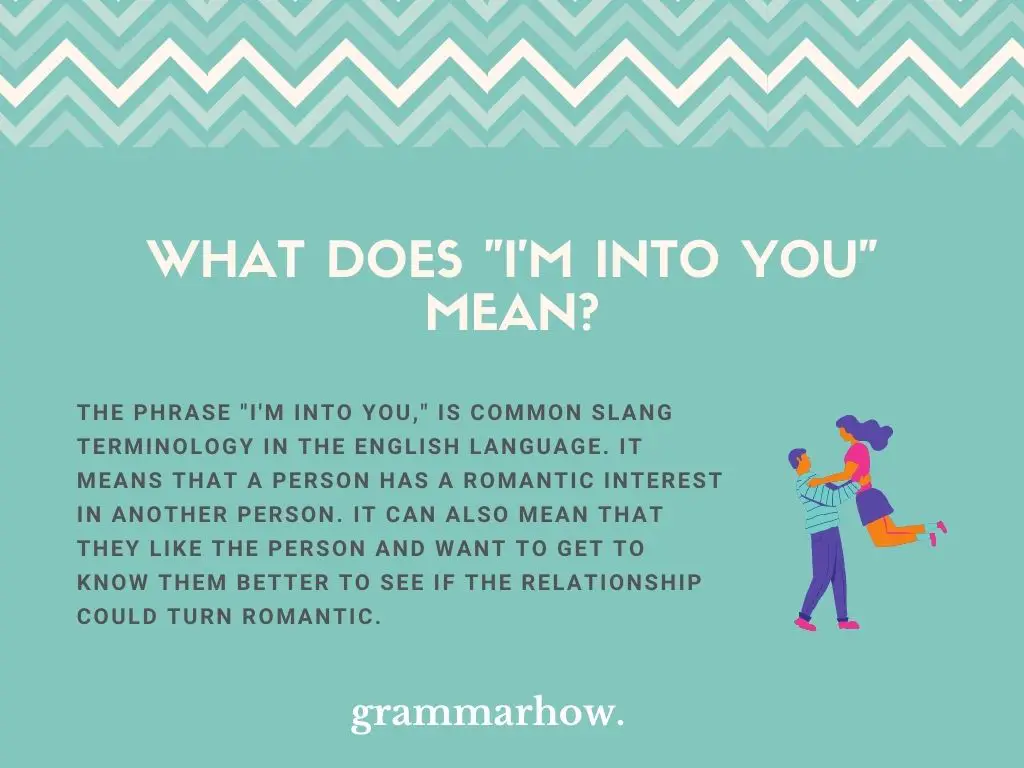The phrase “I’m into you,” is a common phrase you might hear if someone wants to describe being into someone. Here we discuss the meaning of “I’m into you.” We also review how to use it in conversation and provide some words and phrases that have the same meaning.
What Does “I’m Into You” Mean?
The phrase “I’m into you,” is common slang terminology in the English Language. It means that a person has a romantic interest in another person. It can also mean that they like the person and want to get to know them better to see if the relationship could turn romantic.

This phrase is less strong than saying “I love you,” but indicates stronger feelings than saying “I like you.”
Sometimes the words “I’m into” can also be applied to things instead of people. It is used as a way of saying that a person really likes that thing or activity. For example, someone might say “I’m into rock music,” to describe that they like that type of music.
Examples Of How To Use “I’m Into You” In A Conversation
You will often hear variations of the phrase “I’m into you,” in conversations. Some of these variants further emphasize the level at which the person is “into” the other. Others show that a person is interested in another person that is not yourself.
Here are some examples of how you will see this phrase and its variations used in a conversation.
- I know we just met the other day, but I’m into you. Do you want to go out on a date this weekend?
- We’ve been dating for over a month now and I can say without reservation that I’m totally into you.
- I’m really into you. I hope that you feel the same way about me as well.
- See that girl over there? I’m into her but she doesn’t seem to know that I exist.
- I’m definitely into you, I just am so busy with work right now that I don’t have much time to date.
- I think Jason that I’m into him but he said that he’s not interested in a relationship right now.
What Is The Difference Between “I’m Into You” And “I’m Onto You”?
Changing the wording of “I’m into you,” into the phrase “I’m onto you,” alters the meaning significantly. Instead of suggesting that you like or have feelings for someone, the phrase now means that you know you are being tricked or lied to by that person.
The phrase “I’m onto you” can be used in a confrontational way. However, if used among friends, it can take on a more joking or lighthearted tone.
Here are some examples that show the use of “I’m onto you” in conversation.
- I’m onto you! I know that you were the one who tried to trick me!
- Ethan, I’m totally onto your scheme. I know that you didn’t really brush your teeth but just rinsed with mouthwash instead.
- You were lying the other day when you told me that you were busy. I’m completely onto you because I saw you walking in the neighborhood with Mary.
- I’m onto your tricks. I know you were trying to deceive me with what you said the other night.
- I’m completely onto you and your many lies. You’re not that great at hiding what you’re really doing.
What Is The Difference Between “I’m Into You” And “I Like You”?
The phrases “I’m into you,” and “I like you,” can be used interchangeably in many instances. However, depending on the context there can be subtle differences. “I’m into you,” usually suggests the desire for a romantic relationship, and “I like you” does not always mean that.
For example, I might tell a new friend “I like you,” to mean that I enjoy their company and would like to do things together in the future. However, I wouldn’t say “I’m into you,” in this case because it would give the implication that I want more than a platonic friendship.
The phrase “I’m into you,” is also more accepted as slang terminology and wouldn’t be used in a polite conversation. It also would not likely be used often in the written word unless for something very informal, like a text message.
These examples show that both phrases can be used to indicate romantic interest.
- (Correct) I feel that I’m into you and want to spend some time getting to know you better.
- (Correct) I feel that I like you and want to spend some time getting to know you better.
See how changing the phrase in the sentence does not alter the meaning. Both sentences still imply that a romantic connection is desired.
However, in the case of friendship, only the phrase “I like you,” would tend to be appropriate. You can see this fact demonstrated in the examples here.
- (Correct) I like you as a friend-do you want to hang out sometime this weekend?
- (Incorrect) I’m into you as a friend-do you want to hang out sometime this weekend?
See how the phrase “I’m into you,” slightly changes the tone and implications of the sentence.
“I’m Into You” – Synonyms
Here are some other words and phrases that you can use instead of “I’m into you.”
- I love you
- I’m mad about you
- I’m hooked on you
- I care about you
- I’m intrigued by you
- I’m interested in you
- I admire you
- I’m smitten by you

Martin holds a Master’s degree in Finance and International Business. He has six years of experience in professional communication with clients, executives, and colleagues. Furthermore, he has teaching experience from Aarhus University. Martin has been featured as an expert in communication and teaching on Forbes and Shopify. Read more about Martin here.
